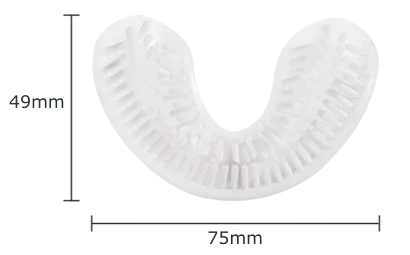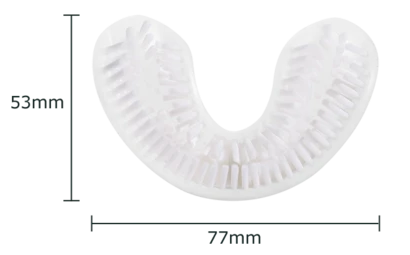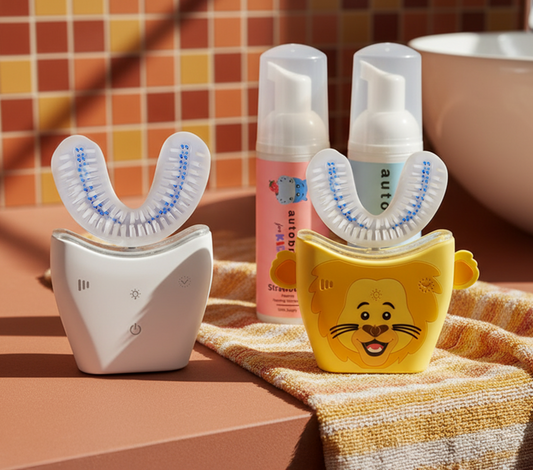
Why Do I Have Bad Breath?
Bad breath, also known as halitosis, is a common concern that affects individuals of all ages. Whether it's a fleeting issue or a persistent problem, bad breath can have a significant impact on one's self-esteem and social interactions. In this blog post, we will look into the reasons behind bad breath, exploring both food-related and health-related causes. Moreover, we will discuss various ways to treat bad breath, including the use of specialized toothpaste like AutoBrush Foaming Toothpaste.
Causes of Bad Breath:
1. Food Choices: The old adage "you are what you eat" holds true in relation to bad breath. Certain foods, such as garlic, onions, and spicy dishes, contain volatile compounds that can linger in the mouth and be released through the breath. These compounds are absorbed into the bloodstream and eventually expelled through the lungs, causing an unpleasant odor.
2. Poor Oral Hygiene: Inadequate oral hygiene practices can lead to a buildup of bacteria in the mouth, resulting in bad breath. Bacteria thrive on food particles and sugars left on teeth and gums. As they break down these particles, they release foul-smelling byproducts. Regular brushing, flossing, and tongue cleaning are essential to prevent bacterial overgrowth.
3. Dry Mouth (Xerostomia): Saliva plays a crucial role in maintaining oral health by washing away food particles and neutralizing acids. A dry mouth can result from factors such as certain medications, medical conditions, and mouth breathing. With reduced saliva flow, the mouth becomes an ideal environment for bacteria to flourish, leading to bad breath.
4. Health Conditions: Underlying health conditions can contribute to halitosis. Respiratory infections, sinusitis, and postnasal drip can release malodorous compounds into the breath. Additionally, gastrointestinal issues like acid reflux can lead to bad breath due to the regurgitation of stomach acids.
5. Smoking and Tobacco Use: Tobacco products contain chemicals that not only leave a strong, unpleasant odor themselves but also lead to gum disease and dry mouth. These factors contribute to persistent bad breath among smokers.
6. Medical Disorders: In some cases, chronic medical conditions such as diabetes, liver disease, and kidney problems can result in bad breath. These conditions may cause unique compounds to be released through the breath, creating an odor that is distinct from typical halitosis.
Treating Bad Breath:
1. Improve Oral Hygiene: Maintaining proper oral hygiene is the cornerstone of preventing and treating bad breath. Brush your teeth at least twice a day, focusing on all surfaces of each tooth. Don't forget to brush your tongue, as it can harbor bacteria. Flossing daily helps remove food particles from between teeth, while mouthwash can provide a temporary freshening effect.
2. Stay Hydrated: Drinking water helps keep your mouth moist and supports saliva production. Chewing sugar-free gum or sucking on sugar-free candies can also stimulate saliva flow.
3. Healthy Diet Choices: Limit foods known to cause bad breath, especially before social interactions. Opt for a diet rich in fruits and vegetables, and avoid excessive consumption of sugary and processed foods.
4. Regular Dental Check-ups: Visiting your dentist regularly allows for the early detection and treatment of any dental issues that might be contributing to bad breath. Professional cleanings remove plaque and tartar buildup that can house bacteria.
5. Quit Smoking: If you smoke or use tobacco products, quitting can significantly improve your breath, along with providing numerous other health benefits.
6. Treat Underlying Conditions: If you suspect an underlying health condition is causing your bad breath, consult a medical professional for appropriate diagnosis and treatment.
AutoBrush Foaming Toothpaste: The Solution for Bad Breath:
One effective way to combat bad breath is by using a toothpaste specifically designed to address this concern. AutoBrush Foaming Toothpaste stands out as a remarkable option for individuals seeking a solution to their halitosis woes.
Formulated with advanced ingredients, AutoBrush Foaming Toothpaste not only helps remove plaque and surface stains but also tackles the root causes of bad breath. It contains antibacterial agents that fight the odor-causing bacteria in the mouth, providing long-lasting freshness. The foaming action ensures that every nook and cranny is reached, resulting in a thorough clean.
What sets AutoBrush Foaming Toothpaste apart is its commitment to both oral health and a pleasant user experience. With its carefully crafted formula and appealing flavor options, it transforms your oral care routine into a delightful and effective practice.
Conclusion:
Bad breath can stem from a variety of factors, including food choices, poor oral hygiene, and underlying health conditions. However, armed with the knowledge of these causes and effective treatment methods, you can take control of your breath and your confidence. By adopting a thorough oral care routine, making healthier dietary choices, and considering specialized toothpaste like AutoBrush Foaming Toothpaste, you can bid farewell to bad breath and welcome a fresher, more vibrant you. Remember, addressing bad breath not only benefits your oral health but also enhances your overall quality of life.















